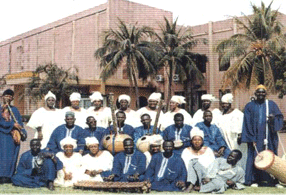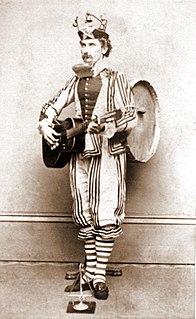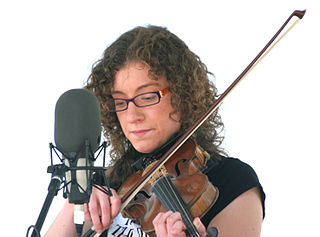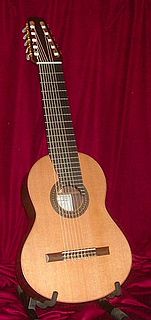
The harp is a stringed musical instrument that has a number of individual strings running at an angle to its soundboard; the strings are plucked with the fingers. Harps can be made and played in various ways, including standing or sitting and in orchestras or concerts. Its most common form is triangular in shape and made of wood. Some have multiple rows of strings and pedal attachments.

The kora is a string instrument used extensively in West Africa. A kora typically has 21 strings, which are played by plucking with the fingers. It combines features of the lute and harp.

String instruments, stringed instruments, or chordophones are musical instruments that produce sound from vibrating strings when a performer plays or sounds the strings in some manner.

The balafon is a gourd-resonated xylophone, a type of struck idiophone. It is closely associated with the neighbouring Mandé, Senoufo and Gur peoples of West Africa, particularly the Guinean branch of the Mandinka ethnic group, but is now found across West Africa from Guinea to Mali. Its common name, balafon, is likely a European coinage combining its Mandinka name bala with the word fôn 'to speak' or the Greek root phono.
There are many styles of traditional and modern music of Ghana, due to Ghana's cosmopolitan geographic position on the African continent. The best known modern genre originating in Ghana is Highlife.So many years, Highlife was the preferred music genre until the introduction of Hiplife and many others.

The Music of Mali is, like that of most African nations, ethnically diverse, but one influence predominates; that of the ancient Mali Empire of the Mandinka. Mande people make up 50% of the country's population, other ethnic groups include the Fula (17%), Gur-speakers 12%, Songhai people (6%), Tuareg and Moors (10%) and another 5%, including Europeans. Mali is divided into eight regions; Gao, Kayes, Koulikoro, Mopti, Ségou, Sikasso, Tombouctou and Bamako.
The U.S. state of North Carolina is known particularly for its history of old-time music. Many recordings were made in the early 20th century by folk song collector Bascom Lamar Lunsford. Influential North Carolina country musicians like the North Carolina Ramblers and Al Hopkins helped solidify the sound of country music in the late 1920s, while influential bluegrass musicians such as Earl Scruggs and Doc Watson came from North Carolina. Arthur Smith had the first nationally syndicated television program which featured country music. He composed "Guitar Boogie", the all-time best selling guitar instrumental, and "Dueling Banjos", the all-time best selling banjo composition. Country artist Eric Church from the Hickory area, has had multiple No. 1 albums on the Billboard 200, including Chief in 2011. Both North and South Carolina are a hotbed for traditional country blues, especially the style known as the Piedmont blues. Elizabeth Cotten, from Chapel Hill, was active in the American folk music revival.
A luthier is a craftsperson who builds and repairs string instruments that have a neck and a sound box. The word "luthier" is originally French and comes from the French word for lute. The term was originally used for makers of lutes, but it came to be used already in French for makers of most bowed and plucked stringed instruments such as members of the violin family and guitars. Luthiers, however, do not make harps or pianos; these require different skills and construction methods because their strings are secured to a frame.
Afel Bocoum is a musician from Mali, noted as a singer and guitarist. He began his career as a member of Ali Farka Touré's group ASCO, and Toure is often regarded as his mentor. Both men come from the town of Niafunke on the River Niger, and are members of the Sonrai people. Bocoum is an agricultural advisor by profession.

A one-man band is a musician who plays a number of instruments simultaneously using their hands, feet, limbs, and various mechanical or electronic contraptions. One-man bands also often sing while they perform.
Amazing Blondel are an English acoustic progressive folk band, containing Eddie Baird, John Gladwin, and Terry Wincott. They released a number of LPs for Island Records in the early 1970s. They are sometimes categorised as psychedelic folk or as medieval folk rock, but their music was much more a reinvention of Renaissance music, based around the use of period instruments such as lutes and recorders.

The harp guitar is a guitar-based stringed instrument generally defined as a "guitar, in any of its accepted forms, with any number of additional unstopped strings that can accommodate individual plucking." The word "harp" is used in reference to its harp-like unstopped open strings. A harp guitar must have at least one unfretted string lying off the main fretboard, typically played as an open string.

Izitso is the tenth studio album released by the British singer-songwriter Cat Stevens in April 1977. After the lacklustre Numbers, the album proved to be his comeback. The album updated the rhythmic folk rock and pop rock style of his earlier albums with the extensive use of synthesizers and other electronic music instruments, giving the album a more electronic rock and synthpop style, and anticipating elements of electro.

Rayna Gellert is an American fiddler, acoustic guitarist, singer, and songwriter specializing in old-time music. She grew up in Elkhart, in northern Indiana, formerly lived in Asheville, North Carolina, and is currently based in Nashville, Tennessee. Her father is the traditional fiddler and banjo player Dan Gellert. Originally a classically trained violinist, she took up the old-time fiddle in 1994, when she moved to North Carolina to attend Warren Wilson College. She received a bachelor's degree from Warren Wilson College.
Tartit are a band from the Tombouctou Region of Mali. The group consists of five women and four men, all of whom are Tamasheq-speaking Tuareg. They formed in 1992 in a refugee camp in Mauritania. Imharhan, an expanded group that includes current and former Tartit members, incorporates electric instruments and cross-cultural experiments into their music.

There are many varieties of ten-string guitar, including:

Kalk Samen Kuri no Hana, also known as Kalk Samen Chestnut Flower and Chlorine Semen Chestnut Flower, is the third studio album by Japanese singer-songwriter Ringo Sheena, released on February 23, 2003, on Toshiba EMI / Virgin Music. The album's lead single was a massive success, topping the Oricon charts for the first time in her career.

Cheick Hamala Diabate is a musician from Mali, West Africa, who has been nominated for a Grammy award. Using Adelphi, Maryland, as his home he travels all over the United States, Canada, Europe, and Asia. He has performed at the Kennedy Center, the United States Senate, and the Smithsonian Institution. Cheick Hamala was born into a griot family in Kita, Mali. From a young age, he learned to play the ngoni, a stringed instrument related to the American banjo. In addition, Cheick has learned the history of Mali passed down for over 800 years. Cheick has performed internationally.
Steven Heller (composer-producer) is a producer-composer, based in Asheville, North Carolina, who has won two Grammy Awards, as well as a number of national awards for his music and recordings. He was production music supervisor for the 1995 Miramax film, "The Journey of August King. He wrote and produced the theme music for "Conversations" and "Evening Rounds," listener call-in programs on the public radio station WCQS, in Asheville, North Carolina. Steven Heller is the father of guitarist Drew Heller of the band Toubab Krewe.
Mamadou Sidiki Diabaté is a prominent Mandé kora player and jeli from Bamako, Mali. He is the 71st generation of kora players in his family and a son to Sidiki Diabaté.












